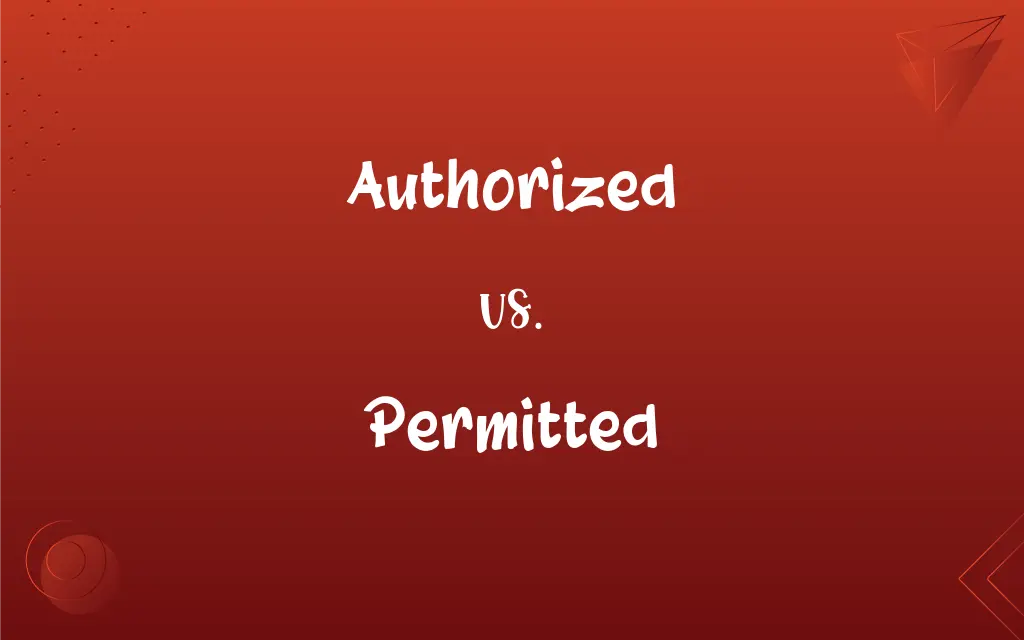Authorized vs. Permitted: What's the Difference?
Edited by Harlon Moss || By Janet White || Published on January 4, 2024
Authorized implies official permission or empowerment by an authority, while permitted suggests allowed, often in a more general sense.

Key Differences
Authorization often comes from a specific authority or official body, suggesting a formal empowerment. Permission can be more general, coming from anyone in a position to allow an action.
Authorization typically carries a more formal connotation, often linked to official or legal power. Permission is broader and can be informal, like social or personal consent.
Being authorized often implies a certain level of power or responsibility granted to perform specific tasks. Being permitted usually means simply having the allowance to do something without necessarily implying additional power or responsibility.
Authorization is commonly used in professional, legal, or official contexts. Permission can be applicable in a wider range of contexts, from personal to official.
Authorization, being formal, often comes with specific terms and conditions and can be formally revoked. Permission, while it can also be withdrawn, is often less tied to strict conditions.
ADVERTISEMENT
Comparison Chart
Source of Approval
Specific authority or official body
Any position of authority, official or informal
Formality and Scope
More formal, often legal or official
Broader, can be informal
Implications of Power
Implies power or responsibility
Simply allows an action, no extra power
Context of Use
Professional, legal, official
Wide range, including personal
Revocation
Formal revocation with terms and conditions
Can be withdrawn, often less formal
ADVERTISEMENT
Authorized and Permitted Definitions
Authorized
Legally empowered or certified.
The agent was authorized to act on behalf of the clients.
Permitted
Allowed or given consent to.
Photography was permitted in the art gallery.
Authorized
Officially empowered or sanctioned.
She was authorized to sign the contract on behalf of the company.
Permitted
Given the go-ahead or green light.
The construction was permitted after the safety inspection.
Authorized
Having official permission to perform a task.
He was authorized to access the confidential files.
Permitted
Having allowance or freedom to do something.
Visitors are permitted to use the library facilities.
Authorized
Given formal permission by an authority.
The committee authorized the new policy implementation.
Permitted
Granted permission, either formally or informally.
She was permitted to leave work early.
Authorized
Endorsed or approved by a governing body.
The program was authorized by the educational board.
Permitted
Acceptable or within the rules.
Smoking is not permitted inside the building.
Authorized
To grant authority or power to.
Permitted
Simple past tense and past participle of permit
Authorized
To give permission for (something); sanction
The city agency that authorizes construction projects.
Permitted
Allowed, authorized.
Authorized
Explicitly allowed.
Permitted
Possible to allow;
A degree of freedom allowable among friends
Authorized
Simple past tense and past participle of authorize
Authorized
Possessed of or endowed with authority; as, an authorized agent.
Authorized
Sanctioned by authority.
Authorized
Endowed with authority
Authorized
Sanctioned by established authority;
An authoritative communique
The authorized biography
FAQs
Who can authorize an action?
Typically, a specific authority, official body, or person with legal power.
Can anyone permit an action?
Yes, anyone in a position of authority, either formally or informally.
Is authorization always legal?
Often, but not exclusively; it can also be professional or organizational.
Is authorization more powerful than permission?
Generally, yes, as it often implies a higher level of power and responsibility.
Can permission be broad in scope?
Yes, it can cover a wide range of activities and contexts.
How can permission be granted?
Verbally, in writing, or through implied consent.
What are examples of authorized actions?
Signing contracts, making official decisions, accessing restricted areas.
What is the meaning of permitted?
Allowed or given consent to, either formally or informally.
What does it mean to be authorized?
It means having official permission or empowerment, often by a specific authority.
Does authorization imply responsibility?
Yes, it often comes with specific responsibilities and duties.
Is parental consent a form of permission?
Yes, it's a common example of informal permission.
Can a company authorize an individual?
Yes, companies often authorize employees for specific tasks or roles.
Does permitted always mean legal?
Not necessarily; something can be permitted socially but not legally, and vice versa.
Can permission be informal?
Yes, permission can be both formal and informal.
What are common permitted activities?
Entering a public place, using facilities, or attending events.
Can authorization be revoked?
Yes, especially if it's formal, it can be revoked by the authorizing body.
What happens when permission is withdrawn?
The previously permitted action becomes disallowed.
What documents might indicate authorization?
Official certificates, letters of authority, or legal documents.
Are there legal implications to authorization?
Yes, legal responsibilities and liabilities can be associated with it.
Can permission be assumed?
In some contexts, yes, but it's safer to seek explicit permission.
About Author
Written by
Janet WhiteJanet White has been an esteemed writer and blogger for Difference Wiki. Holding a Master's degree in Science and Medical Journalism from the prestigious Boston University, she has consistently demonstrated her expertise and passion for her field. When she's not immersed in her work, Janet relishes her time exercising, delving into a good book, and cherishing moments with friends and family.
Edited by
Harlon MossHarlon is a seasoned quality moderator and accomplished content writer for Difference Wiki. An alumnus of the prestigious University of California, he earned his degree in Computer Science. Leveraging his academic background, Harlon brings a meticulous and informed perspective to his work, ensuring content accuracy and excellence.







































































